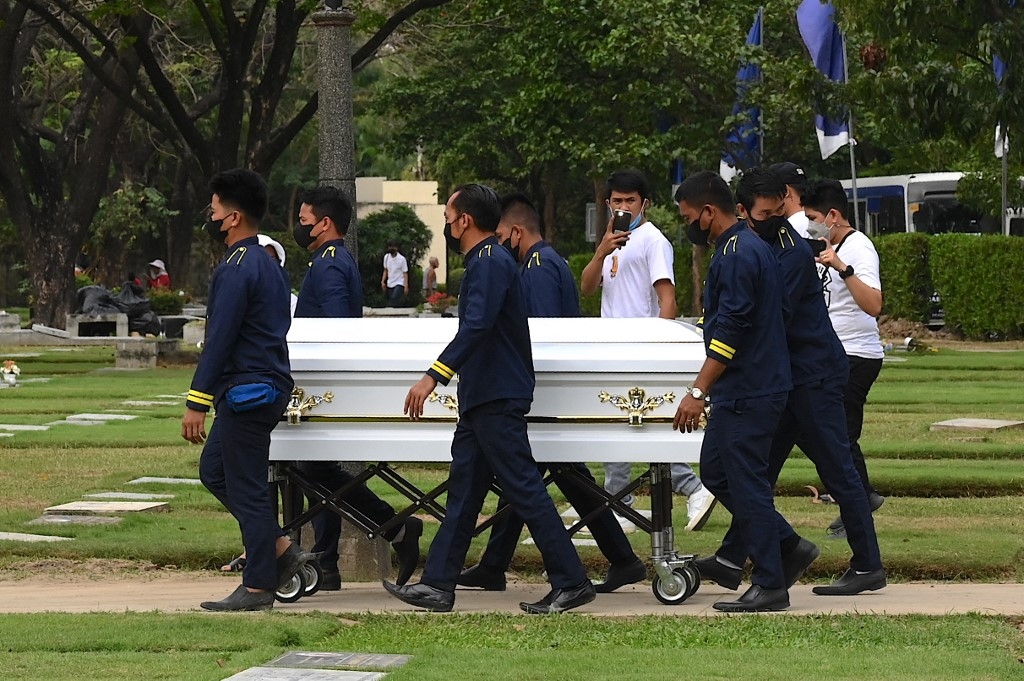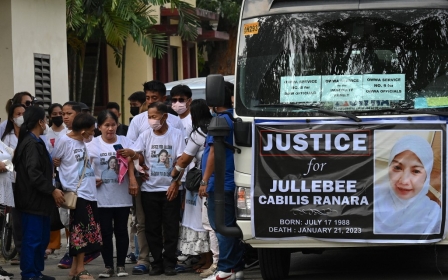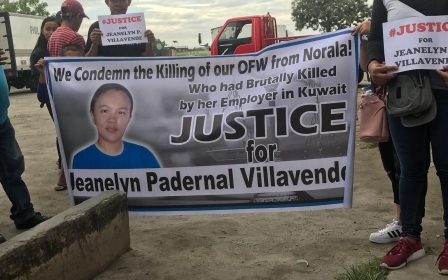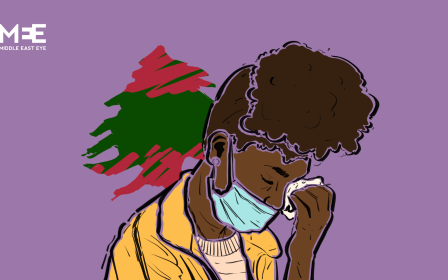Philippines seeks harsher sentence for Kuwaiti teenager who murdered Filipina woman

The Philippines has vowed to explore whether it can extend the jail sentence for a Kuwaiti teenager found guilty and sentenced to 15 years for the murder of a Filipina woman.
Last week, the Filipino Department of Foreign Affairs (DFA) said that Turki Ayed al-Azmi, aged 17, had been sentenced by a juvenile court for the murder of 34-year-old Filipina, Jullebee Ranara, whose head was smashed in and body burned.
Ranara was reportedly killed by her employer's son, Azmi, having had her skull smashed in before being burnt to a crisp and left to die in the desert.
Later reports also indicate that Ranara was pregnant at the time of her death.
The Kuwaiti court also sentenced Azmi to another year in prison for driving without a licence.
New MEE newsletter: Jerusalem Dispatch
Sign up to get the latest insights and analysis on Israel-Palestine, alongside Turkey Unpacked and other MEE newsletters
But following Azmi's sentencing, Ranara's family said the sentence did not match the crime and urged the Filipino government to demand a harsher punishment.
These concerns prompted the Filipino government to visit Ranara's family and tell local media that it would be considering "other legal options" to demand a harsher punishment for Azmi.
Speaking to ANC Digital on Sunday, Hans Leo Cacdac, the officer-in-charge of the Department of Migrant Workers, said he "explained to the family that the suspect is a minor, which is why the juvenile criminal law of Kuwait was applied. We'll be consulting with our attorney regarding other legal options".
Eduardo De Vega, the under-secretary for the Philippines' DFA, added: "The problem with appealing is that damages will have to be included, so it may take longer. The point is the killer was not absolved, so he can't be set free."
Earlier this year, Manila stopped sending first-time workers to Kuwait after Ranara's charred dead body was found in the desert in January this year.
Civil society leaders in Manila also called on the Filipino government to do more to protect workers, as Ranara's death adds to a series of incidents of abuse faced by Filipino workers in Kuwait.
Commenting on the judgement, the DFA said it was "grateful" for the outcome but noted that Azmi's family could still appeal the decision in the next thirty days.
“The family of [Ranara] has been informed and is grateful for the assistance provided to them by the government,” the DFA said in a statement.
“The Philippine government acknowledges the efforts undertaken by the Kuwaiti authorities to effect a speedy resolution of the case in the pursuit of justice for our slain ‘kababayan.'”
Millions of Filipinos work abroad, with a significant portion landing jobs in Gulf countries as well as in Jordan and Lebanon under the exploitative kafala (sponsorship) system, which legally binds migrant workers to their employers.
The system leaves workers "vulnerable to wage abuse, employer exploitation, and situations that amount to forced labor", according to Human Rights Watch.
Previous cases of abuse in Kuwait
Approximately 268,000 Filipino nationals live and work in Kuwait.
Remittances from overseas workers also accounted for 8.9 percent of the Philippines' gross domestic product in 2022.
Problems between the Philippines and Kuwait, however, stem from an incident in 2018 when Filipina worker Joanna Demalfelis was found dead in her employer's freezer.
This incident led former President Rodrigo Duterte to impose a deployment ban.
Despite reports of more deaths and instances of abuse, Manila eased restrictions.
But earlier this year, Kuwait imposed restrictions on Filipino workers entering the Gulf state after the Kuwaitis accused the Philippines of violating Kuwaiti law by supporting Filipinos who ran away from their employers.
The alleged violations carried out in Kuwait include housing abused workers in shelters, looking for women who had run away without informing local authorities, communicating with Kuwaiti citizens without permission, and pressuring employers to add clauses to work contracts.
In 2020, Kuwait sentenced a Kuwaiti woman to death for killing Jeanelyn Villavende, a Filipina worker who was allegedly physically and sexually abused by her employers.
An embalming certificate released by Kuwait's Ministry of Health said that Villavende died of "acute failure of heart and respiration" due to shock and multiple injuries in the vascular and nervous systems.
However, a separate autopsy by the Philippines National Bureau of Investigation on 10 January 2020 showed the 26-year-old had healed wounds, suggesting that she was beaten weeks before her death, and had "clear indications of sexual abuse".
Middle East Eye delivers independent and unrivalled coverage and analysis of the Middle East, North Africa and beyond. To learn more about republishing this content and the associated fees, please fill out this form. More about MEE can be found here.




